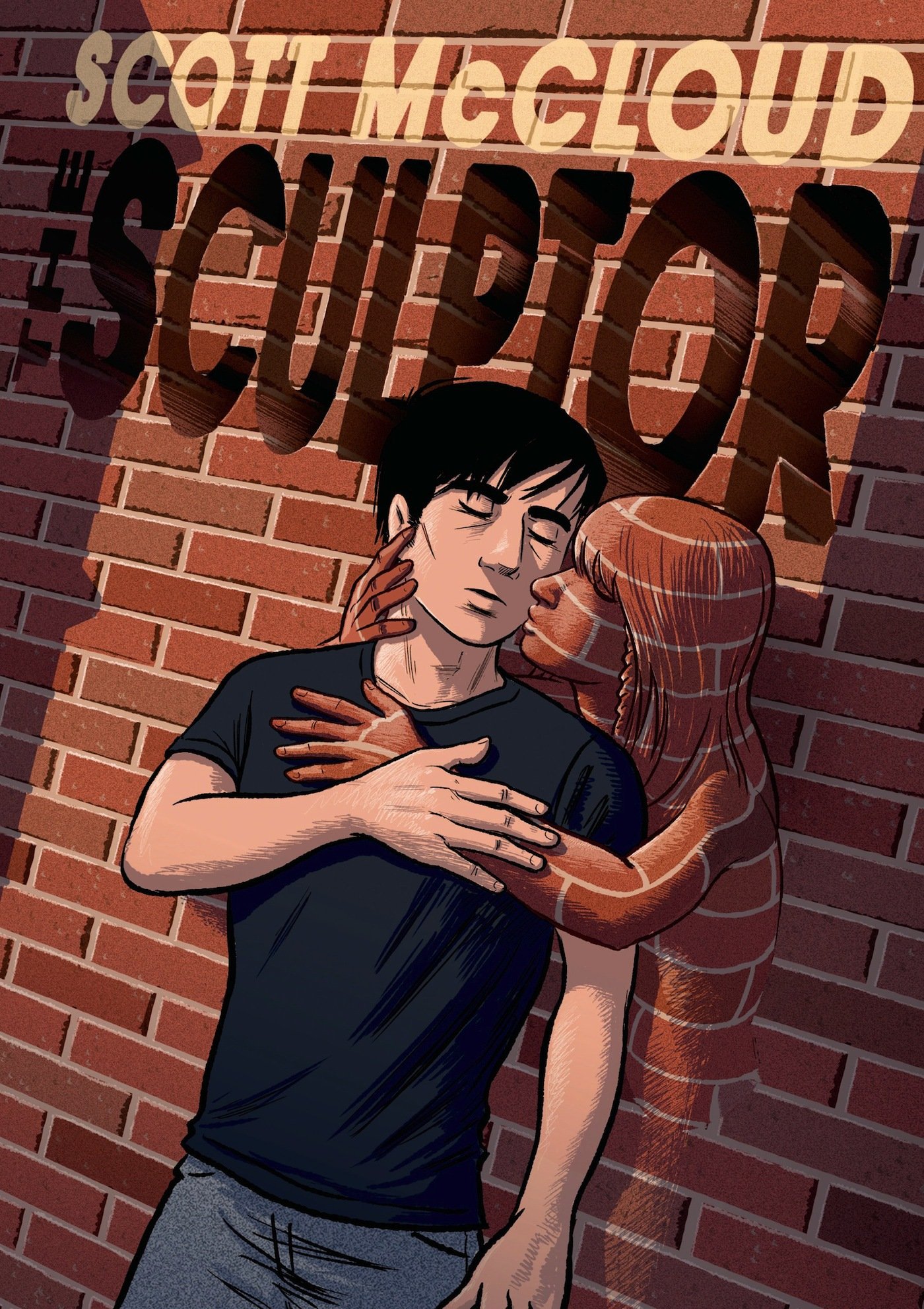 |
Image from
|
David Smith is a sculptor at the end of his rope, having blown his moment in the spotlight of the New York art scene and possessed of little save his idiosyncratic set of promises to himself. While spending his last few dollars in a diner, he is joined by his uncle, who he soon realizes is not the man he remembers. Death, bound in human form until its last link to the living is broken, offers his host's nephew the power to make the shapes in his mind reality in exchange for a hard limit on his remaining time among the living: 200 days. By the end of the first part, David is a real character. Not simply a sad sack, nor merely a victim of his own introversion and iconoclastic tendencies, his backstory and path to the state in which we find him are crisply laid out, but not with the excessive precision often lavished on exposition to get it out of the way; the other characters draw these details to the surface for us as the tale progresses. His chance transformation into a viral video star puts him in contact with guerilla actress-slash-bike courier Meg and her found family of artists and hard-luck strays like himself. McCloud takes pains not to make their relationship seem too foreordained or too permanent. David's grim chess-playing benefactor advises against it for her sake, but it does eventually and surprisingly gel distressingly close to the end, and in a way which canny readers might realize well in advance of the explanation will make the plans hatched by the lovebirds as the clock ticks down all for naught. Meg herself is not some insubstantial manic pixie dream girl without well-developed problems of her own. McCloud presents her experiencing repeated depressive episodes, and her long-term friends take issue with what they perceive as David's lack of seriousness, unsuitability to assist, and even his role in enabling her resistance to taking her medication, all of which underscore Death's advice.
McCloud has long been highly self-critical about his artistic skill, generally citing a lack of dynamism in form as his weakness. While in his now quarter-century old ZOT! comics he sometimes managed to make a flying superhero look a bit stiff, here he makes a poor stiff, David -- forbidden from superheroics by Death -- look quite expressive, indeed. His power to reshape matter can be exercised by mere touch,but McCloud draws him as an artist immersed in the creative process, using muscle and motion to conduct stone, steel, glass, wood, etc., into new forms like an emphatic maestro leading an orchestra. He dives into blocks of stone, rolls up sidewalks, and bends I-beams with his bare hands.Outside the panels, McCloud reaches deep into the toolbox he examined in Understanding Comics and uses the layout to help set tone and even suggest when a world beyond David's intrudes. In every two-page opening, at least one panel bleeds to the edge, perhaps leading in or out of a scene; in scenes of great passion, be they artistic, carnal, or otherwise, the panel boundaries contract to almost nothing, and the action flows uninhibited from panel to panel. The dichromatic color printing is used to good effect as well, with blues fading from bold to atmospheric, allowing the city to be present but distant in some places, and suffocating in others without requiring too much heavy linework.
The Sculptor is a great modern low fantasy story which could have easily gone any number of directions under its establishing premise but chose to be a well-grounded exploration of its characters and how their grand and banal motivations, in turn, betray them and drive them to leave a mark before shuffling off.
McCloud has long been highly self-critical about his artistic skill, generally citing a lack of dynamism in form as his weakness. While in his now quarter-century old ZOT! comics he sometimes managed to make a flying superhero look a bit stiff, here he makes a poor stiff, David -- forbidden from superheroics by Death -- look quite expressive, indeed. His power to reshape matter can be exercised by mere touch,but McCloud draws him as an artist immersed in the creative process, using muscle and motion to conduct stone, steel, glass, wood, etc., into new forms like an emphatic maestro leading an orchestra. He dives into blocks of stone, rolls up sidewalks, and bends I-beams with his bare hands.Outside the panels, McCloud reaches deep into the toolbox he examined in Understanding Comics and uses the layout to help set tone and even suggest when a world beyond David's intrudes. In every two-page opening, at least one panel bleeds to the edge, perhaps leading in or out of a scene; in scenes of great passion, be they artistic, carnal, or otherwise, the panel boundaries contract to almost nothing, and the action flows uninhibited from panel to panel. The dichromatic color printing is used to good effect as well, with blues fading from bold to atmospheric, allowing the city to be present but distant in some places, and suffocating in others without requiring too much heavy linework.
The Sculptor is a great modern low fantasy story which could have easily gone any number of directions under its establishing premise but chose to be a well-grounded exploration of its characters and how their grand and banal motivations, in turn, betray them and drive them to leave a mark before shuffling off.
- RET3, Guest Blogger